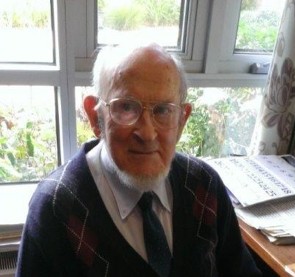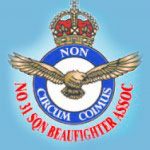Gordon Cant
Gordon Cant (M.I.D)

Gordon Rayner Cant, born on 6 July 1922 at Nyah West, I attended Nyah State School and then worked on the family properties for several years. I studied book-keeping by correspondence and was employed in clerical duties in the local fruit-packing shed. I was called up for military service in November 1941, spending 18 months as signaller in a Motor Regiment. In March 1943, I transferred to R.A.A.F. aircrew. After training as a Navigator/Wireless Operator/Air Gunner, I joined 31 Beaufighter Squadron, based at Coomallie Creek, south of Darwin, in September 1944. From that base, and later when based on Moratai and Sanga Sanga Islands, I took part in the Squadron’s operations against Japanese targets in Timor, the Celebes, the Halmeheras, Ambon, as well as Tarakan and Labuan in North Borneo.
Myself and my pilot Ken Sounness of Mount Barker W.A. survived two crashes and one ditching at sea, the latter being due to enemy anti-aircraft fire. Ken was awarded the D.F.C. for his services and I received an M.I.D.
After the war, I returned to studies at Swan Hill High School, gaining the Leaving Certificate and a Special Matriculation Certificate in Mathematics and English, in 1948. I then graduated from Melbourne University in 1952 with a Bachelor of Arts and Diploma of Education. I went on to teach Mathematics, English and History in Technical and High Schools.
I retired in 1985 and now live with my wife, Helen, in Villa Maria Aged Care, Wantirna South.
Gordon Recounts Memories of War Experiences:
In the course of our Operational Training and about 40 operations with 31 Squadron, from bases at Coomalie, Morotai and Sanga Sanga, we had numerous hazardous experiences. At Williamtown O.T.U., we survived a crash after hitting a tree while making an approach for our first night landing. The subsequent belly landing on the strip was spectacular, if not dignified, and we were very, very fortunate. At Coomalie, we survived a crash into the ditch when the aircraft swung on take-off. The late Don Reeve, our fitter 2A, who was standing behind Ken, did not find it at all enjoyable. With broken fuel lines and hot engines, it was a miracle that the aircraft did not burn. It almost happened again with potentially fatal results, when an attempted landing at Coomalie went wrong and we swung off the tarmac once more. This time Ken “gave her the gun”, but we narrowly missed hitting the trees on the side of the strip when he was forced to bank sharply at zero altitude, while “going around again”. It was an extremely close call.
Our first operation against Japanese targets in Timor was not without incident either, as we were forced to make the long return flight on one motor. However, worse was to follow. Operating in Morotai on the 1st of January, 1945, we were hit on one motor by machine gun fire while making a low-level sweep from Celebes. From 30 miles inland, Ken struggled to gain altitude to clear the coastal mountains before pressing out to sea. Due to loss of oil pressure, he was unable to feather the propeller in the damaged motor, and consequently the aircraft was vibrating violently. Nevertheless, we got half-way home to Morotai before the damaged engine caught fire and we ditched 50 miles from base. Four hours later, we were rescued by Air-Sea-Rescue Catalina, a very welcome sight.
Our involvement with Catalinas continued on the 31st of March 1945, with another aircraft which ditched immediately a few hundred yards off the beach. With pilot, Ross Roberts, and navigator Basil Phillips, in the dinghy, and the nearest Catalina three to four hours away towards Borneo, the situation was precarious. Without checking our fuel situation, Ken, to his eternal credit, immediately agreed to cover the dinghy until the Catalina arrived, even though this might mean ditching our aircraft also, because of the fuel shortage. In spite of the tense situation, the Catalina pilot, Wally Mills, introduced a lighter note when he radioed me to say, “Usually we charge a fee for this service, but if you bring your aircraft clock with you if you ditch, we will call it square”.
Well, we covered the dinghy for about three hours, but meanwhile, Acting C.O. Bob Bowman despatched two Beaufighters to come to our rescue. They covered the 400 odd miles from Morotai at high speed and they arrived before the Catalina. Tom Ellis and Eric Coleman took over protection of the dinghy, while Ron Edwards and Ken Edmanson escorted us towards base, where we arrived safely with 15 gallons of fuel left, after 7 hours 35 minutes airborne.
When the Catalina arrived at the dinghy and prepared to land, all hell broke loose. The dinghy had drifted further seawards, but the rescue was a most hazardous operation, made under heavy fire from Japanese coastal batteries on both sides of the narrow strait. The Japanese scored hits on the Catalina, and the Gunnery Officer, Bill Hastie, was seriously injured. Meanwhile, Tom Ellis was lending valuable support, strafing the coastline, even though one of his motors had been shot out. The two men were hauled from the water, and against the odds, the Catalina succeeded in becoming airborne and escorted the damaged Beaufighter safely to base. Fortunately, Bill Hastie made a good recovery, and for their contribution to the action, D.F.Cs. were awarded to Wally Mills, Bill Hastie, Tom Ellis and Ken Sounness.
This dramatic incident illustrated the spirit of mateship and co-operation which prevailed in 31 Squadron and in the R.A.A.F. generally.
Memories of Flying Officer Ken Sounness D.F.C.
The sudden death of Ken Sounness of Mount Barker, W.A., on the 25thOctober 1950, aged 27 years, was a devastating tragedy, accentuated, for his family and many friends, by the death of his younger brother Paul, aged 20 years, two days later. Both men were victims of an acute attack of poliomyelitis. The effect of this double tragedy on the Sounness family, Ken’s wife Jeanne, and his two younger daughters, can only be imagined. For them, and for me personally, as his Navigator and close friend, it was difficult to accept that Ken, having survived many dangerous situations as a Beaufighter pilot during the war, should have his life cut so short in this way.
Thanks to Gordon for his contribution to this web site, and to Judy & Trevor Warren-Smith for their assistance.( the website team)
